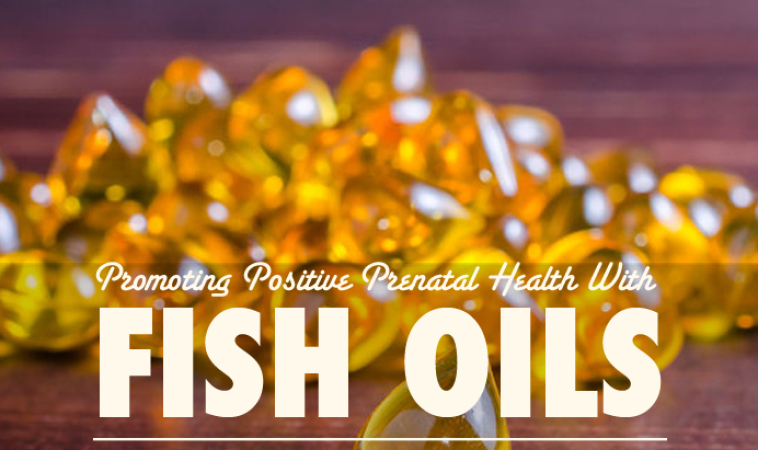This month, I am continuing with the trend on my daily supplement recommendations during pregnancy – today the focus is on another popular supplement, fish oils. Fish oils consists of long-chain, polyunsaturated, omega-3 fatty acids, which are touted for their numerous health-promoting properties, such as their impact on cardiovascular health, mental health, and joint pain. The health benefits of supplementing fish oils during pregnancy is not any different. The use of fish oils during pregnancy is mainly supportive and preventative – they are not typically recommended to treat any specific condition if a women is healthy, but are used to support the stages of development of mother and baby during the prenatal period. Omega 3 fatty acids are delivered to the baby through the placenta, and the amount of omega 3s found in the baby is correlated to the amount mom ingests during pregnancy, outlining the importance of daily supplementation of essential fatty acids during this time. The beneficial properties of fish oil can be attributed to two types of omega-3 fatty acids almost exclusive to fish oils: EPA and DHA.
DHA
Many of the health-improving properties can be linked to DHA. DHA is a major component of cell membranes and is found in high concentration in the central nervous system and the retina of the eye. A great deal of DHA is transported to the baby during the last trimester of pregnancy, which actually coincides with the late stages of brain and eye development. For this reason, DHA thought to be essential for the development of these systems in a growing fetus and is the primary reason why people tend to supplement fish oils during pregnancy.2 Several studies have found fish oil intake can prevent low birth weight and premature births, both of which has been linked to low DHA exposure in the third trimester. The prevention of low birth weight with DHA could possibly be related to its blood pressure reducing properties, high blood pressure also being a cause of low birth weight.3
EPA and DHA have been found to be helpful in prenatal health largely due their anti-inflammatory effects4. Numerous studies have demonstrated that supplementation of fish oils during pregnancy have been found to reduce the risk of prenatal complications such as gestational diabetes, preeclampsia and high blood pressure, all conditions related to inflammation.4,5 Lower incidences of jaundice and newborn hospitalization rates have also been found in infants who were born to women supplementing with fish oils.4 Fish oils are currently being studied for their potential and promising effects on preventing premature births, which have also been linked to inflammation and imbalanced immune function.6 Also, fish oils and fish intake during pregnancy have been found to reduce the incidence of immune-mediated atopic diseases, such as allergies, asthma and eczema in children from these supplemented pregnancies.6,7 Children from pregnancies where mom has supplemented with fish oils have higher levels of omega-3s and anti-inflammatory markers in their systems. Overall the favourable effects fish oils have on the immune system provide a great reason to supplement fish oils during pregnancy.
Other advantages of fish oil supplementation pregnancy include increased focus in concentration, and fewer mood and behavioural problems by 6 years of age.8 Supplementation of fish oils, particularly DHA, has also been found to potentially help reduce anxiety during pregnancy.9
Dietary supplementation of these oils are extremely important as the placenta is not able to synthesize EPA and DHA to the amount that is needed for the growing baby, making most of the EPA and DHA that is needed based solely on diet.10 Fish oil supplements may be superior to dietary intake of fish alone for a couple of reasons. First, a number of factors may make it difficult for expecting women to achieve the weekly intake goal (of 8-12oz) of fish, such as morning sickness and food aversions during this delicate time. Secondly, the mercury and other pollutants/contaminated in fish make regular fish and seafood ingestion cause for concern1. Fish oil supplements an attractive alternative to dietary fish intake as these contaminants are filtered out during the purification processes in high-quality fish oil brands.
Dosage
The dose of fish oils used in studies typically total 1g of fish oils, daily, with DHA dose equalling around 400-600mg per day and is considered safe at these dosages. It is important to find a fish oil that is offered in free triglyceride form, as it is more stable form, better absorbed and easily processed by the body. Also, look for fish oils made from small fish, like sardines and anchovies as they have the lowest risk of contamination, and avoid cod-liver oil sources due to the high vitamin A content, which can be toxic in pregnancy.
The numerous health benefits of supplementing fish oils during pregnancy cannot go unnoticed as they are continuously being found to help create positive outcomes during the prenatal and postnatal period. For these reasons, I consider them a staple for maintaining and promoting a healthy pregnancy for an expecting mom and the growing baby inside.
 Dr. Tanya Lee, N.D. received her Honours Bachelor of Science degree in Biochemistry and Biomedical Sciences from McMaster University, and was trained as a Naturopathic Doctor at the Canadian College of Naturopathic Medicine. Dr Lee practices full-time between two clinics located in Toronto and Milton Ontario and has been voted Milton’s favourite Naturopath in 2013 and 2014. Her primary care practice focuses on family medicine, treating a wide variety of conditions such as hormonal (endocrine) disorders, fertility, digestive problems, cardiovascular disease, diabetes, insomnia and fatigue. She has a special interest in the treatment of autoimmune diseases, paediatric and perinatal health. Tanya offers her clinical knowledge to a number of publications, including the Natural Path.
Dr. Tanya Lee, N.D. received her Honours Bachelor of Science degree in Biochemistry and Biomedical Sciences from McMaster University, and was trained as a Naturopathic Doctor at the Canadian College of Naturopathic Medicine. Dr Lee practices full-time between two clinics located in Toronto and Milton Ontario and has been voted Milton’s favourite Naturopath in 2013 and 2014. Her primary care practice focuses on family medicine, treating a wide variety of conditions such as hormonal (endocrine) disorders, fertility, digestive problems, cardiovascular disease, diabetes, insomnia and fatigue. She has a special interest in the treatment of autoimmune diseases, paediatric and perinatal health. Tanya offers her clinical knowledge to a number of publications, including the Natural Path.
References:
- Swanson D. Omega-3 fatty acids EPA and DHA: health benefits throughout life. Adv Nutr. 2012 Jan;3(1):1-7. doi: 10.3945/an.111.000893.
- Rogers, LK et. al. DHA supplementation: current implications in pregnancy and childhood. Pharmacol Res2013 Apr; 70(1): 13-9
- Skilton MR et. al. High intake of dietary long-chain ω-3 fatty acids is associated with lower blood pressure in children born with low birth weight: NHANES 2003-2008. 2013 May;61(5):972-6. doi: 10.1161/HYPERTENSIONAHA.111.01030.
- Jamilian M et. al. Omega-3 fatty acid supplementation affects pregnancy outcomes in gestational diabetes: a randomized, double-blind, placebo-controlled trial. JMatern Fetal Neonatal Med. 2015 Mar 9:1-7.
- Poniedzialek-Czajkowska E et. al. Polyunsaturated fatty acids in pregnancy and metabolic syndrome: a review. Curt Pharm Biotechnol. 2014: 15(1):84-99.
- De Giuseppe R al. n-3 LC-PUFA supplementation: effects on infant and maternal outcomes. Eur J Nutr. 2014 Aug;53(5):1147-54. doi: 10.1007/s00394-014-0660-9.
- Miyata J, Arita M. Role of omega-3 fatty acids and their metabolites in asthma and allergic diseases. Allergol Int. 2015 Jan;64(1):27-34. doi: 10.1016/j.alit.2014.08.003.
- Steenweg-de Graaff JC Maternal LC-PUFA status during pregnancy and child problem behavior: the Generation R Study. Pediatr Res. 2015 Mar;77(3):489-97. doi: 10.1038/pr.2014.204.
- Verly-Miguel MV et. al. Serum docosahexaenoic acid (DHA) is inversely associated with anxiety disorders in early pregnancy. J Anxiety Disord. 2015 Mar;30:34-40. doi: 10.1016/j.janxdis.2014.12.002. Epub 2014 Dec 20.
- Jones ML al. Maternal dietary omega-3 fatty acids and placental function. Reproduction. 2014 Apr 8;147(5):R143-52. doi: 10.1530/REP-13-0376.
















